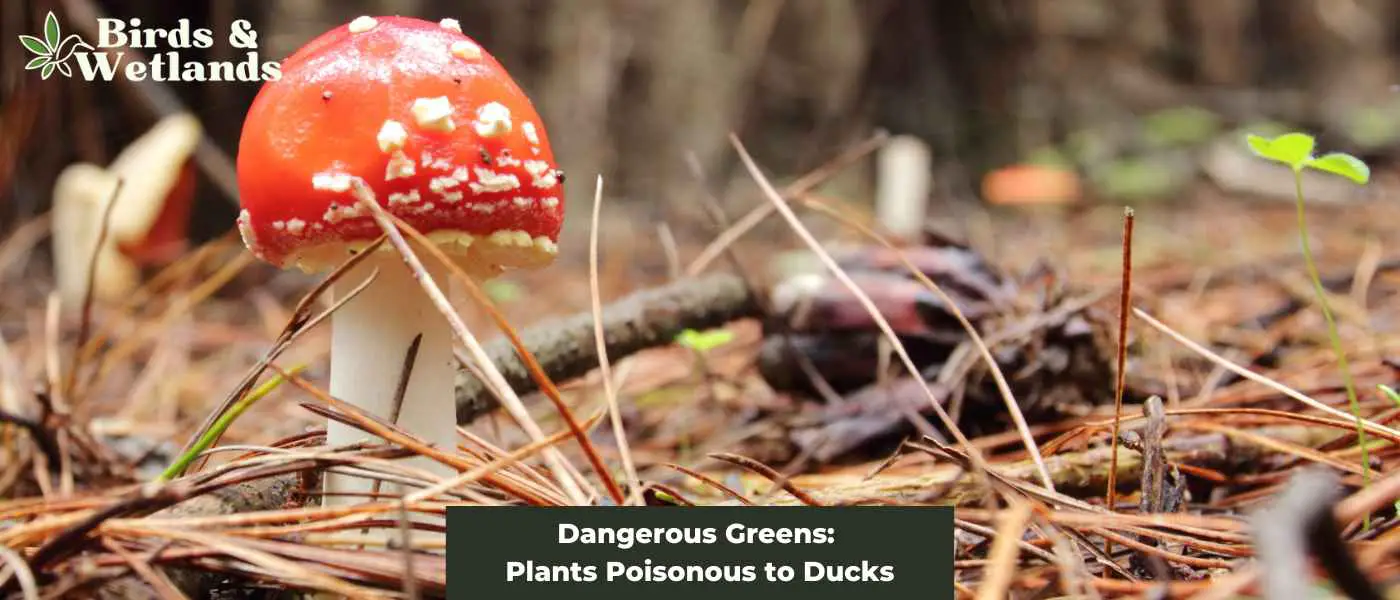Ducks are foraging animals that enjoy a variety of plants as part of their natural diet. However, not all plants are safe for ducks to consume.
Some common garden plants can be toxic to ducks, leading to severe health issues or even death. It is essential to be aware of these plants and take steps to prevent ducks from ingesting them.
What plants are poisonous to ducks?
There are several common plants that can be poisonous or toxic to ducks, potentially causing harm or even death if ingested. Some common poisonous plants to watch out for include foxglove, rhubarb leaves, azaleas, nightshade, oleander, and yew. It’s essential to be aware of these plants and keep ducks away from them to ensure their safety and well-being.
Key Takeaways
Be cautious of toxic plants, such as foxglove, rhubarb leaves, azaleas, nightshade, oleander, and yew
When ducks eat poisonous plants can harm or even kill ducks
Keep ducks away from these plants to ensure their safety and well-being
Toxic Garden Plants
Rhubarb Leaves
Rhubarb is a popular garden plant known for its edible stalks, which are often used in pies and jams. However, the leaves of the rhubarb plant are toxic to ducks and other animals due to their high oxalic acid content. Oxalic acid is a naturally occurring compound that can be harmful when ingested in large amounts.
In ducks, oxalic acid can bind to essential minerals like calcium and magnesium, preventing their absorption and leading to mineral deficiencies. High levels of oxalic acid can cause irritation and damage to the ducks’ digestive system.
The consumption of rhubarb leaves by ducks can lead to kidney damage, as their bodies attempt to process and eliminate the toxic compounds. Over time, this can result in kidney failure, which can be fatal. To protect ducks from the dangers of rhubarb leaves, it is essential to keep them away from these plants or remove them from the ducks’ environment.
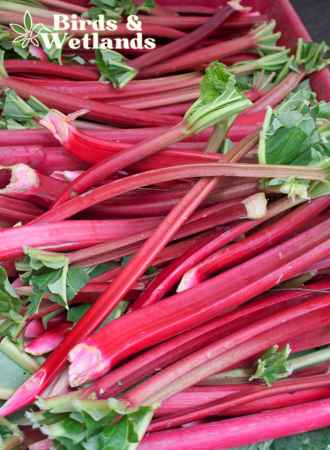
Foxglove, Nightshade, and Other Toxic Plants
Foxglove, nightshade, and other toxic garden plants can pose a significant threat to ducks’ health. These plants contain various toxic compounds that can cause a range of symptoms and health problems when ingested by ducks.
For example, foxglove contains digitalis glycosides, which can lead to heart issues, while nightshade plants like deadly nightshade and potato plants contain toxic alkaloids like solanine and atropine.
The symptoms of poisoning from toxic garden plants can vary depending on the specific plant and the compounds it contains. In general, ducks that have consumed poisonous plants may experience gastrointestinal issues, such as vomiting, diarrhea, and abdominal pain.
They may also display neurological symptoms like tremors, seizures, or paralysis. In severe cases, ingestion of toxic plants can lead to organ failure or death.
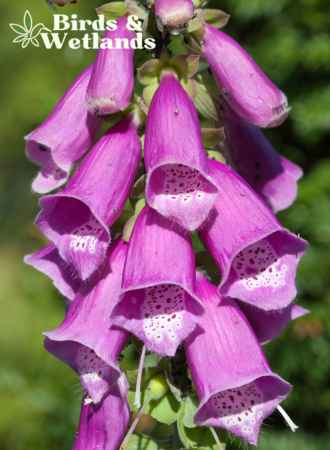
Azaleas and Rhododendrons
Azaleas and rhododendrons are popular ornamental plants that can be found in many gardens. Unfortunately, these plants contain grayanotoxins, which are toxic to ducks and other animals. Grayanotoxins interfere with the normal function of red blood cells, leading to a variety of symptoms and health issues.
When ducks consume azaleas or rhododendrons, they may experience gastrointestinal issues like vomiting, diarrhea, and abdominal pain. Grayanotoxins can affect the heart, leading to irregular heartbeats and potential heart failure.
To protect ducks from the dangers of azaleas and rhododendrons, it is crucial to keep them away from these plants or remove them from the ducks’ environment.
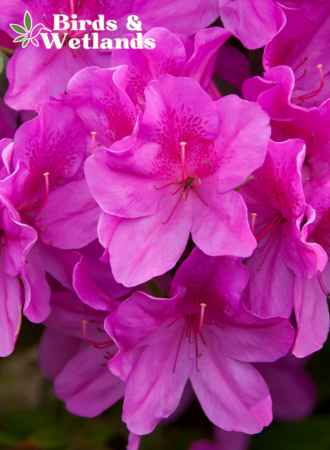
Poisonous Trees and Shrubs
Ducks are naturally curious creatures that enjoy foraging for food in their environment. However, some trees and shrubs can be toxic to ducks, leading to severe health issues or even death. It is crucial to be aware of these poisonous plants and take steps to prevent ducks from ingesting them.
Yew Trees
Yew trees are evergreen plants that are often used in landscaping due to their attractive appearance. However, these trees contain toxic compounds called taxine alkaloids, which can be harmful to ducks and other animals. Taxine alkaloids interfere with the normal function of cells, leading to various symptoms and health problems.
When ducks consume parts of a yew tree, they may experience nervous system issues, such as tremors, seizures, or paralysis. Taxine alkaloids can affect the heart, leading to irregular heartbeats and potential heart failure.
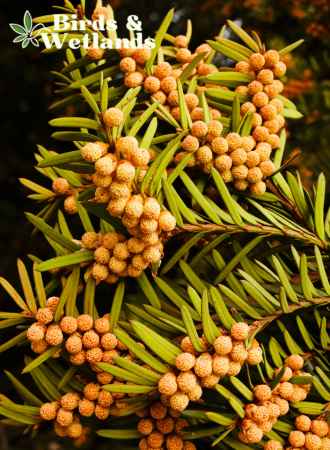
Cherry, Peach, and Apricot Trees
Cherry, peach, and apricot trees are popular fruit-bearing plants that can be found in many gardens and orchards. Unfortunately, the leaves and seeds of these trees contain cyanide-producing compounds called amygdalin, which can be toxic to ducks and other animals. When ingested, amygdalin is broken down into hydrogen cyanide, a highly poisonous substance.
Symptoms of cyanide poisoning in ducks include difficulty breathing, muscle weakness, tremors, and seizures. In severe cases, cyanide poisoning can lead to respiratory failure and death.
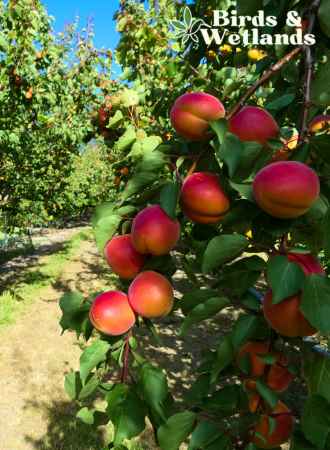
Oleander
Oleander is an attractive flowering shrub that is often used in landscaping. However, all parts of the oleander plant are toxic to ducks and other animals due to the presence of cardiac glycosides. These compounds interfere with the normal function of cells, particularly in the heart, leading to various symptoms and health problems.
When ducks consume parts of an oleander plant, they may experience heart problems such as irregular heartbeats and potential heart failure.
Other symptoms of oleander poisoning include gastrointestinal issues like vomiting and diarrhea, as well as neurological symptoms like tremors and seizures.
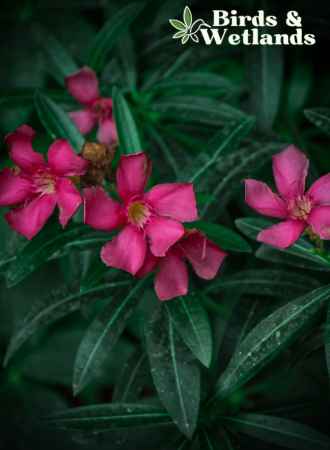
Toxic Aquatic Plants
Aquatic environments can provide ducks with a rich source of food and habitat. However, some aquatic plants can be toxic to ducks, leading to severe health issues or even death. It is crucial to be aware of these poisonous plants and take steps to prevent ducks from ingesting them.
Water Hemlock
Water hemlock is a highly toxic plant found in wetlands and along the edges of ponds and streams. This plant contains cicutoxin, a potent neurotoxin that can be fatal to ducks and other animals. When ingested, cicutoxin disrupts the normal function of the nervous system, leading to various symptoms and health problems.
Symptoms of water hemlock poisoning in ducks include tremors, seizures, and difficulty breathing. In severe cases, ducks may experience respiratory failure, leading to death.
To protect ducks from the dangers of water hemlock, it is essential to identify and remove these plants from their environment or prevent ducks from accessing areas where water hemlock is present.
Blue-Green Algae
Blue-green algae, also known as cyanobacteria, are microscopic organisms that can grow rapidly in water bodies under certain conditions, forming harmful algal blooms. These blooms can produce various toxins, including microcystin, which is toxic to ducks and other animals. Exposure to these toxins can cause a range of symptoms and health issues in ducks.
When ducks ingest water or food contaminated with blue-green algae toxins, they may experience liver damage, neurological issues, and gastrointestinal problems. In severe cases, exposure to blue-green algae toxins can be fatal.
To protect ducks from the dangers of blue-green algae, it is crucial to monitor their environment for algal blooms and take steps to prevent ducks from accessing contaminated water or food.
Prevention and Management
One of the most effective ways to protect ducks from the dangers of toxic plants is to identify and remove these plants from their habitats. This may involve regular inspections of duck ponds and surrounding areas, as well as removing any poisonous plants found.
Ensuring that ducks have access to a balanced and nutritious diet can help reduce the risk of poisoning from toxic plants. By providing ducks with a variety of healthy foods, such as grains, vegetables, and insects, you can help support their overall health and well-being.
It is essential to closely monitor ducks for any signs of poisoning, such as lethargy, loss of appetite, or unusual behavior. If you suspect that a duck has ingested a toxic plant, it is crucial to seek veterinary care immediately. Prompt treatment can help minimize the harmful effects of the toxin and improve the duck’s chances of recovery.
It’s crucial for duck owners to keep their pets away from toxic plants and to ensure that their environment is free of any potentially harmful vegetation. By being aware of the plants that are poisonous to ducks, owners can help keep their feathered friends safe and healthy.
10 Foods Ducks Should Never Eat
There are several foods ducks should never eat, as they can be harmful to their health or even fatal. Here’s a list of foods that should be avoided:
Bread, crackers, and junk food: These foods lack nutritional value and can cause malnutrition, obesity, and other health issues in ducks.
Chocolate: Chocolate contains theobromine, which is toxic to ducks. Ingesting chocolate can lead to theobromine poisoning, causing symptoms such as vomiting, diarrhea, seizures, and even death.
Onions and garlic: These foods can cause hemolytic anemia in ducks by damaging their red blood cells. This can lead to weakness, illness, and life-threatening complications.
Avocado: The skin and pit of avocados contain persin, a toxin that can cause respiratory distress, heart problems, and death in ducks.
Caffeine: Ducks are sensitive to caffeine, which can act as a stimulant on their nervous system. Ingesting caffeine can cause rapid heartbeat, seizures, and potentially fatal consequences.
Green tomatoes and unripe fruits: Green tomatoes contain solanine, which can be toxic to ducks. Unripe fruits can also cause gastrointestinal issues and other health problems.
Fruit pits and seeds: Some fruit pits and seeds contain cyanide, which is toxic to ducks. Large seeds or pits can pose a choking hazard.
Rhubarb leaves: Rhubarb leaves contain oxalic acid, which can cause kidney damage and even death in ducks if consumed in large quantities.
Toxic plants: Some plants, such as foxglove, nightshade, and water hemlock, are poisonous to ducks and can cause life-threatening consequences if ingested.
Salt: High levels of salt can cause dehydration and kidney damage in ducks. It’s essential to avoid feeding ducks salty foods or adding salt to their diet
.
Dos
- Feed ducks cracked corn, oats, rice, or birdseed
- Provide fresh, chopped vegetables and fruits
- Offer leafy greens like lettuce, kale, or spinach
- Supply small insects, snails, and aquatic plants
- Give frozen peas as a nutritious treat
- Provide fresh water daily
- Offer calcium sources like crushed oyster shells
Don’ts
- Avoid feeding ducks bread or junk food
- Don’t offer onions, garlic, avocado, or raw potatoes
- Keep ducks away from chocolate or caffeinated products
- Refrain from giving ducks large amounts of green tomatoes
- Avoid feeding ducks unripe or overripe fruits
- Don’t leave uneaten food lying around
Toxic Foods and Materials
Ducks are curious and will often pick up and eat anything that catches their fancy. Unfortunately, some of the things they eat can be toxic and even deadly. It’s important to keep an eye on what your ducks are eating and make sure they don’t have access to anything that could harm them.
Just like humans, ducks love junk food. However, feeding them chips, crackers, or other processed snacks can be harmful to their health so never feed ducks bread or junk good. These foods are often high in salt, sugar, and fat, which can lead to obesity, heart disease, and other health problems.
Rotten or moldy foods can contain harmful toxins that can make your ducks or wild ducks sick. Avoid feeding them any food that has gone bad, including fruits and vegetables that have started to rot.
While coffee grounds are not toxic to ducks, they can be harmful in large quantities. Coffee contains caffeine, which can cause hyperactivity, heart palpitations, and even death in ducks. If you must use coffee grounds in your garden, make sure to keep them away from your ducks.
Ducks are lactose intolerant, which means they can’t drink milk or other dairy products. Feeding them cheese, yogurt, or other dairy products can cause digestive problems, including diarrhea and vomiting.
A compost pile can be a great way to recycle food scraps and other organic materials. However, it’s important to keep your compost pile away from your ducks. Decomposing food can produce harmful toxins that can make your ducks sick.
It’s important to be mindful of what your ducks are eating to ensure their health and well-being. Avoid feeding them junk food, rotten foods, or dairy products, and keep them away from coffee grounds and compost piles. By taking these simple steps, you can help keep your ducks safe and healthy.
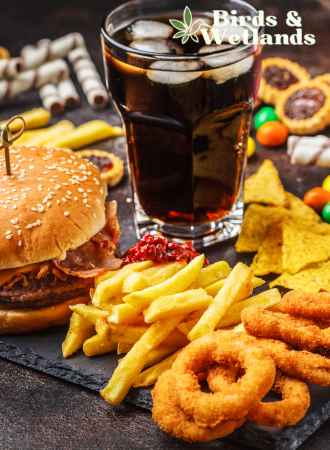
Potatoes and Tomatoes
Potatoes and tomatoes are both part of the nightshade family and contain toxins that can be harmful to ducks. However, not all parts of these plants are toxic.
Green potatoes and green tomatoes contain solanine and chaconine, both of which are present in the peel, flesh, and sprouts of the plants. These toxins can cause digestive upset, weakness, and even death in ducks. Therefore, it is important to avoid feeding green potatoes and tomatoes to ducks.
While potatoes are not toxic when cooked or ripe, feeding potatoes to ducks should be done in moderation. Feeding too many potatoes can cause digestive upset and diarrhea in ducks. It is also important to note that ducks should not be fed raw potatoes, as they are difficult to digest and can cause blockages in the digestive system.
Cooked potatoes can be part of ducks feed in small amounts as a treat. However, it is important to avoid feeding them mashed or seasoned potatoes, as these can contain harmful ingredients such as garlic or onion. It is best to stick to plain, boiled or baked potatoes. Sweet potatoes are also fine for most duck breeds.
Ripe tomatoes are safe for ducks to eat in moderation. However, it is important to remove the stems and leaves, as they contain the same toxins as green tomatoes. It is also important to avoid feeding overripe or moldy tomatoes, as these can cause digestive upset.
Citrus fruits, like a green potato, should be considered toxic food for ducks and should not form part of the daily food ration. Other foods to be excluded are salty foods, apple seeds, dry beans which are not cooked and certain seeds.
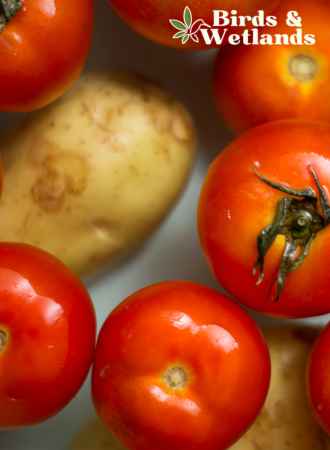
Medicated Chick Starter and Calcium Absorption
Medicated chick starter is a type of feed that contains amprolium, a medication used to prevent coccidiosis in poultry. While it is commonly used for chicks, some farmers have also fed it to ducks it is not recommended for ducks, as it can cause toxicity and even death in some cases.
One of the reasons why medicated chick starter is not suitable for ducks is its effect on calcium absorption. Calcium is an essential mineral for ducks, as it is needed for the formation of strong bones and eggshells. However, the presence of amprolium in medicated chick starter can interfere with calcium absorption, leading to a deficiency.
Medicated chick starter can also cause other health problems in ducks. The medication can accumulate in the liver and kidneys, leading to toxicity and organ damage. Symptoms of toxicity include weakness, lethargy, loss of appetite, and diarrhea.
It is recommended that duck owners avoid feeding medicated chick starter to their ducks. Instead, they should opt for unmedicated chick starter or other feeds that are specifically formulated for ducks. It is also important to provide a balanced diet that includes a variety of nutrients, including calcium, to ensure the health and well-being of ducks.
Best Waterfowl Feed
Delightful Feeding Experience
Transform your backyard into a scenic waterfowl habitat and enjoy an interactive feeding experience with Natural Waterscapes Waterfowl Floating Food.

Pros
- Nutritious Food: Natural Waterscapes Waterfowl Floating Food is specifically designed to provide essential nutrients to waterfowl, including swans, geese, and ducks, helping them maintain a healthy diet.
- Convenient: The food comes in resealable packaging, making it easy to store and use as needed. It is also easy to handle and transport.
- Floating Formula: The floating formula of the food allows it to remain on the surface of the water, making it easier for waterfowl to eat and minimizing the risk of water contamination.
- Attracts Waterfowl: The food is formulated to attract various waterfowl species, including swans, geese, and ducks, to your pond, lake, or other water body, providing an opportunity to observe and enjoy these beautiful creatures.
- Environmentally Friendly: Natural Waterscapes Waterfowl Floating Food is made with environmentally friendly ingredients and does not contain any harmful preservatives, making it safe for both waterfowl and the environment.
Cons
- Shelf Life: The food’s shelf life may be limited compared to other types of waterfowl food due to its natural ingredients and lack of preservatives. This means you may need to use it up quickly after opening the package to prevent it from going bad.
Health Issues Related to Food
Ducks are omnivores and enjoy a variety of foods, including a few plants, insects, and small animals. However, some foods can be harmful to their health, causing stunted growth, digestive problems, ill effects, heart-related deaths, aflatoxin poisoning, and kidney failure.
Stunted Growth
Ducks that do not receive adequate nutrition may experience stunted growth. This can occur if they do not receive enough protein, vitamins, and minerals. A diet lacking in these essential nutrients can cause ducks to have smaller body sizes, weaker bones, and reduced egg production.
Digestive Problems
Ducks have a sensitive digestive system, and certain foods can cause digestive problems. Foods that are high in fat, salt, or sugar can cause diarrhea, vomiting, and dehydration. Feeding ducks moldy or spoiled food can lead to digestive problems and even death.
Ill Effects
Some foods can cause ill effects in ducks, even if they are not toxic. For example, feeding ducks too much bread can cause them to become malnourished and overweight. Feeding ducks food that is too high in protein can cause kidney damage.
Heart Related Deaths
Feeding ducks food that is high in salt or fat can lead to heart-related deaths. Foods like chips, crackers, and other processed foods should be avoided. Instead, ducks should be fed a diet that is high in fruits, vegetables, and protein.
Aflatoxin Poisoning
Aflatoxin is a toxin produced by a fungus that grows on certain foods, such as corn and peanuts. If ducks consume these contaminated foods, they can develop aflatoxin poisoning, which can cause liver damage and even death.
Kidney Failure
Feeding ducks food that is too high in protein can cause kidney failure. This is because ducks have a difficult time processing excess protein, which can lead to a buildup of waste products in the kidneys. Over time, this can cause kidney damage and even failure.
Toxicity and Health Issues in Ducks
Ducks are vulnerable to various toxins, and their health can be severely affected by consuming poisonous plants or substances. Here are some of the toxicity and health issues that ducks can face:
Respiratory Issues
Ducks can be sensitive to airborne toxins, such as mold, chemicals, and cigarette smoke. These toxins can cause respiratory issues like coughing, wheezing, and nasal discharge. Inhaling dust from bedding material or feed can cause respiratory irritation.
Excessive Amounts
Overconsumption of certain substances can cause health problems in ducks. For example, ducks that eat too much bread or other processed foods can develop obesity, which can lead to leg problems and reduced mobility. Similarly, ducks that consume excessive amounts of salt can develop dehydration and kidney damage.
Allergic Reaction
Ducks can have allergic reactions to certain substances, just like humans. For example, some ducks may be allergic to certain types of feed or bedding material. Symptoms of an allergic reaction can include itching, swelling, and respiratory distress.
Even Death
Some plants and substances are highly toxic to ducks and can cause sudden death even in small amounts. For example, the toxin called persin, found in avocado, can be fatal to ducks. Similarly, certain types of algae blooms can produce toxins that can kill ducks within hours of ingestion.
Ducks are prone to various health issues and toxicities, which can cause respiratory problems, leg problems, allergic reactions, and even death. It is crucial to provide ducks with a safe and healthy environment, free from toxins and harmful substances, to ensure their well-being.

FAQs on What is Poisonous to ducks
Can ducks eat seeds? Are they toxic to ducks?
Ducks can eat a variety of seeds, but some seeds, such as fruit pits and certain plant seeds, can be toxic to ducks. It’s essential to research which seeds are safe and provide them in moderation.
Should I let my ducks free-range? What about plant material in their environment?
Free-ranging can be beneficial for ducks as a mixed flock or a duck flock as it allows them to forage for natural foods and the freedom is good for their general health. However, it’s important to ensure that their environment is free from toxic plants and dangerous plant material.
Can ducks access my compost pile?
Generally speaking, while a compost pile can provide a source of food for ducks, it can also contain harmful substances or decomposing plant material that may be toxic. It’s best to keep ducks away from compost piles to avoid potential health issues.
Can ducks eat ripe tomatoes and other nightshade family plants?
Ducks can safely eat ripe tomatoes, but green tomatoes and other nightshade family plants can be toxic. It’s crucial to only offer ripe tomatoes and ensure that ducks don’t have access to other nightshade plants while free-ranging.
Are dairy products safe for ducks?
Ducks may have difficulty digesting dairy products, leading to gastrointestinal issues and other health problems. It’s best to avoid feeding dairy products to ducks.
Is cracked corn a good food option for ducks?
Cracked corn is a suitable food option for ducks, providing them with essential nutrients and energy. It can be offered as part of a balanced diet, along with other grains, vegetables, and insects.
Can ducks choke on certain foods, like large seeds or fruit pits?
Yes, ducks can choke on large seeds or fruit pits, as they pose a choking hazard. It’s essential to provide food in appropriate sizes to prevent choking and ensure their safety.
By being aware of the potential dangers of poisonous plants and food, you can help ensure the health and well-being of your ducks.
Are hostas bad for ducks?
Hostas are a popular ornamental plant often found in gardens and landscaping. While hostas are not considered highly toxic to ducks, they may still cause gastrointestinal upset if consumed in large quantities.
Best Duck Feed Pellets
Are you a duck owner looking for the perfect feed to keep your feathered friends happy and healthy? Look no further than Purina Duck Feed Pellets! With their nutritionally balanced formula and high-quality ingredients, these pellets are the ultimate solution for providing your ducks with the nutrition they need to thrive.
Pros
- Complete Nutrition: Purina Duck Feed Pellets are nutritionally balanced to provide all the essential vitamins and minerals that ducks need to stay healthy and strong.
- Easy to Digest: The pellets are specially formulated to be easy to digest, which makes them ideal for ducks of all ages.
- Promotes Growth and Development: With its balanced nutrition formula, Purina Duck Feed Pellets are designed to support healthy growth and development in ducks.
- Suitable for All Breeds: Whether you have domestic ducks or wild ducks, Purina Duck Feed Pellets are suitable for all breeds of ducks.
- Trusted Quality: Purina has been producing high-quality animal feed for over 100 years, so you can trust that your ducks are getting the best possible nutrition with Purina Duck Feed Pellets.
Cons
- Cost: Compared to other types of duck feed on the market, Purina Duck Feed Pellets can be slightly more expensive. However, many customers feel that the high-quality ingredients and balanced nutrition formula are worth the extra investment.
- Pellet Size: Some customers have noted that the pellet size of Purina Duck Feed Pellets can be quite large, which may not be suitable for smaller or younger ducks. However, many customers have reported that the pellets can easily be broken up or soaked in water to make them easier to eat.

